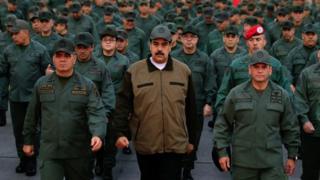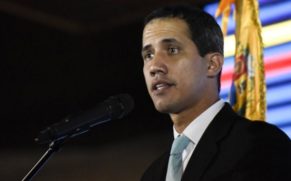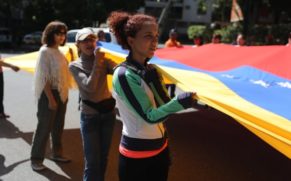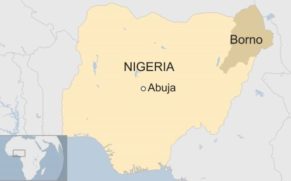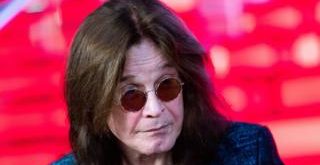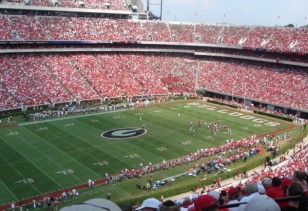Venezuelan President Nicolás Maduro has appeared flanked by soldiers at an army base in Caracas, in a show of defiance towards his opponents.
Mr Maduro called on the armed forces to defeat “any coup plotter”, following two days of clashes between opposition and pro-government forces.
Opposition leader Juan Guaidó tried on Wednesday to spark a military rebellion and force Mr Maduro from office.
Mr Guaidó has urged public employees to strike to undermine the government.
But Mr Maduro praised the army’s loyalty. “No-one dare touch our sacred ground or bring war to Venezuela”, he said.
Four people died in the clashes, including two teenagers.
In January, Mr Guaidó declared himself Venezuela’s interim leader and he has the support of more than 50 countries including the US, UK and most Latin America nations.
As the head of the opposition-controlled National Assembly, he invoked the constitution to assume an interim presidency, arguing that Mr Maduro’s re-election last year was illegitimate.
But Mr Maduro – who is backed by Russia, China and the leaders of Venezuela’s military – has refused to cede power.
The president dismissed a claim by US Secretary of State Mike Pompeo that he had been ready to flee the country, and accused the US of directing an attempted coup.
How did the violence unfold?
On Wednesday, both pro- and anti-government supporters held demonstrations in Caracas that were initially peaceful.
There were reports of gunfire in the city, and a local NGO, the Venezuelan Observatory of Social Conflict, said Jurubith Rausseo, 27, had been shot dead during a rally in the opposition stronghold of Altamira.
At least 46 people were injured in clashes between opposition supporters and the security forces.
On Tuesday, Mr Guaidó declared what he called the “final phase” of the operation to topple Mr Maduro. He posted a video of him with a number of men in uniform and said he had the support of “brave soldiers” in Caracas.
- Is there a new cult of personality in Venezuela?
- How much aid is getting into Venezuela?
- Who is buying Venezuela’s oil?
He urged Venezuelans to join them on the streets, and appeared alongside another opposition leader, Leopoldo López, who had been under house arrest after being found guilty of inciting violence during protests in 2014.
Spain’s government later said that Mr López and his family had sought safety in their embassy, but said the opposition figure had not claimed political asylum.
A court issued an arrest warrant for Mr López for violating the house arrest order, according to a statement on the Supreme Court’s website. The order stated that Mr López should continue to serve the rest of his 13-year sentence in prison.
Spain said it had no intention of handing over Mr López to the Venezuelan authorities.
How significant is Guaidó’s call for strikes?
In a series of tweets (in Spanish), Mr Guaidó said the final phase of “Operation Liberty” had begun and it was the turn of public workers to join in.
He urged protesters to stay on the streets until Mr Maduro’s government was finally forced to resign.
Mr Guaidó has been courting the public sector for weeks – but winning their support will be difficult, says BBC’s Americas editor Candace Piette.
For years, state employees have been told that if they did not turn up at government rallies, they would lose their jobs.

